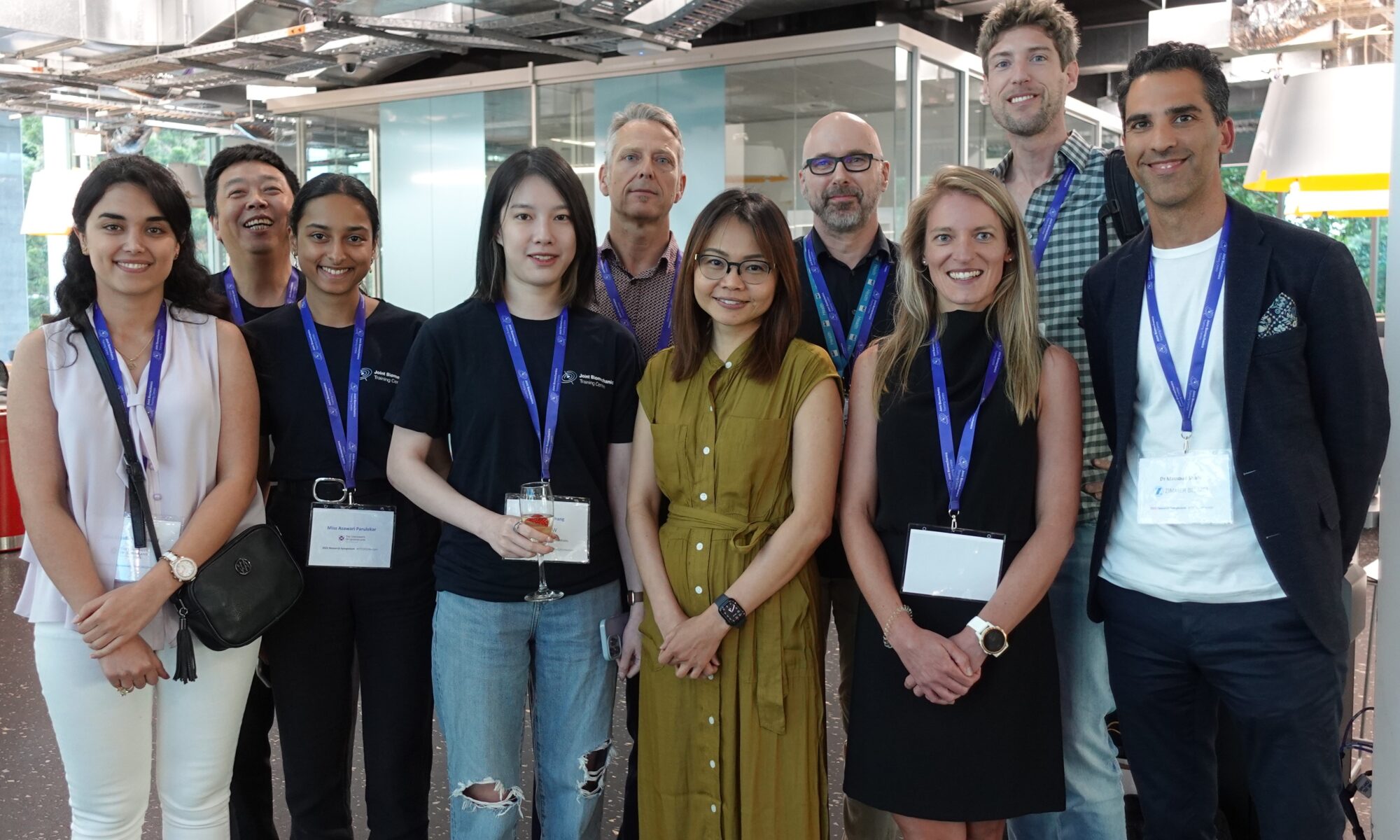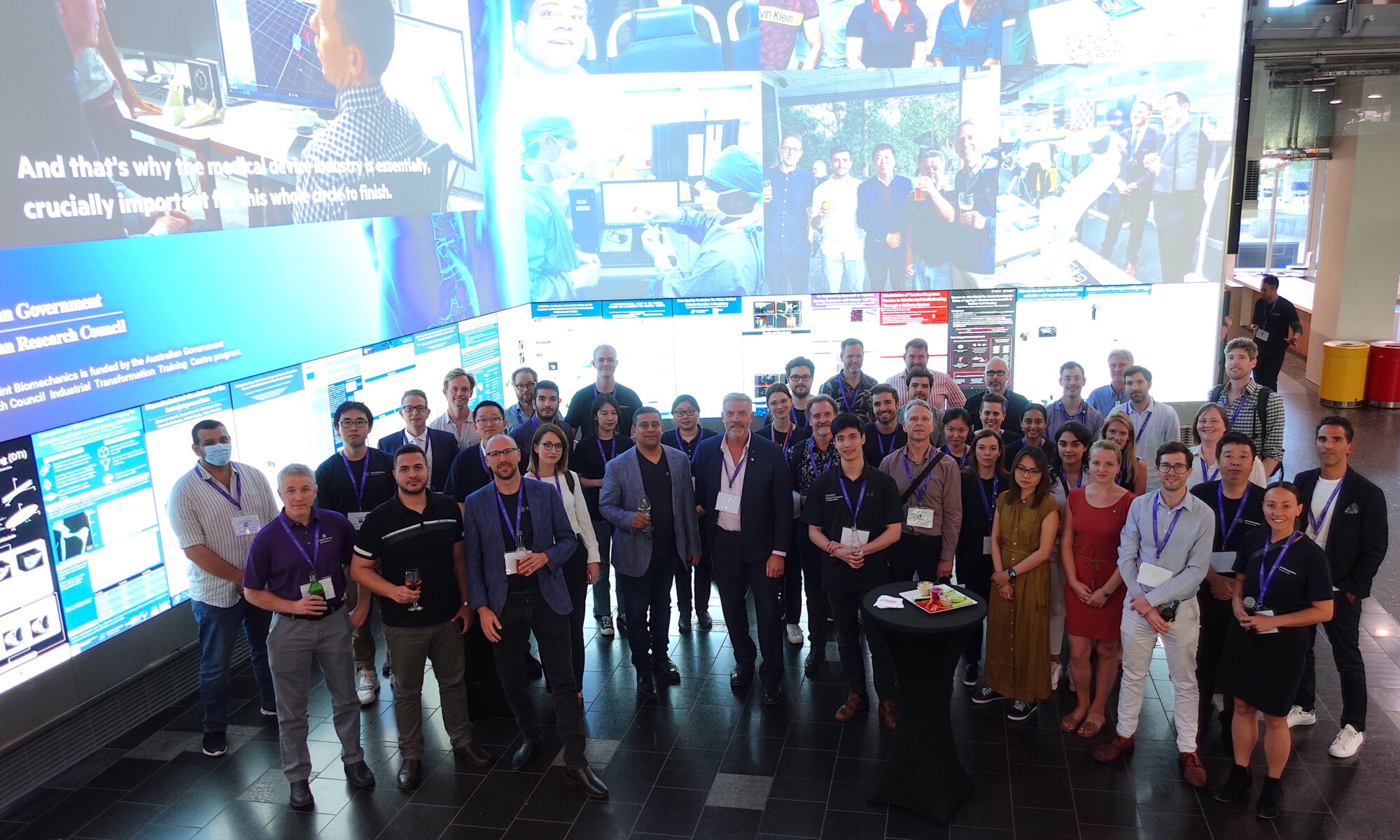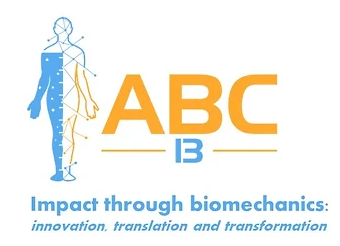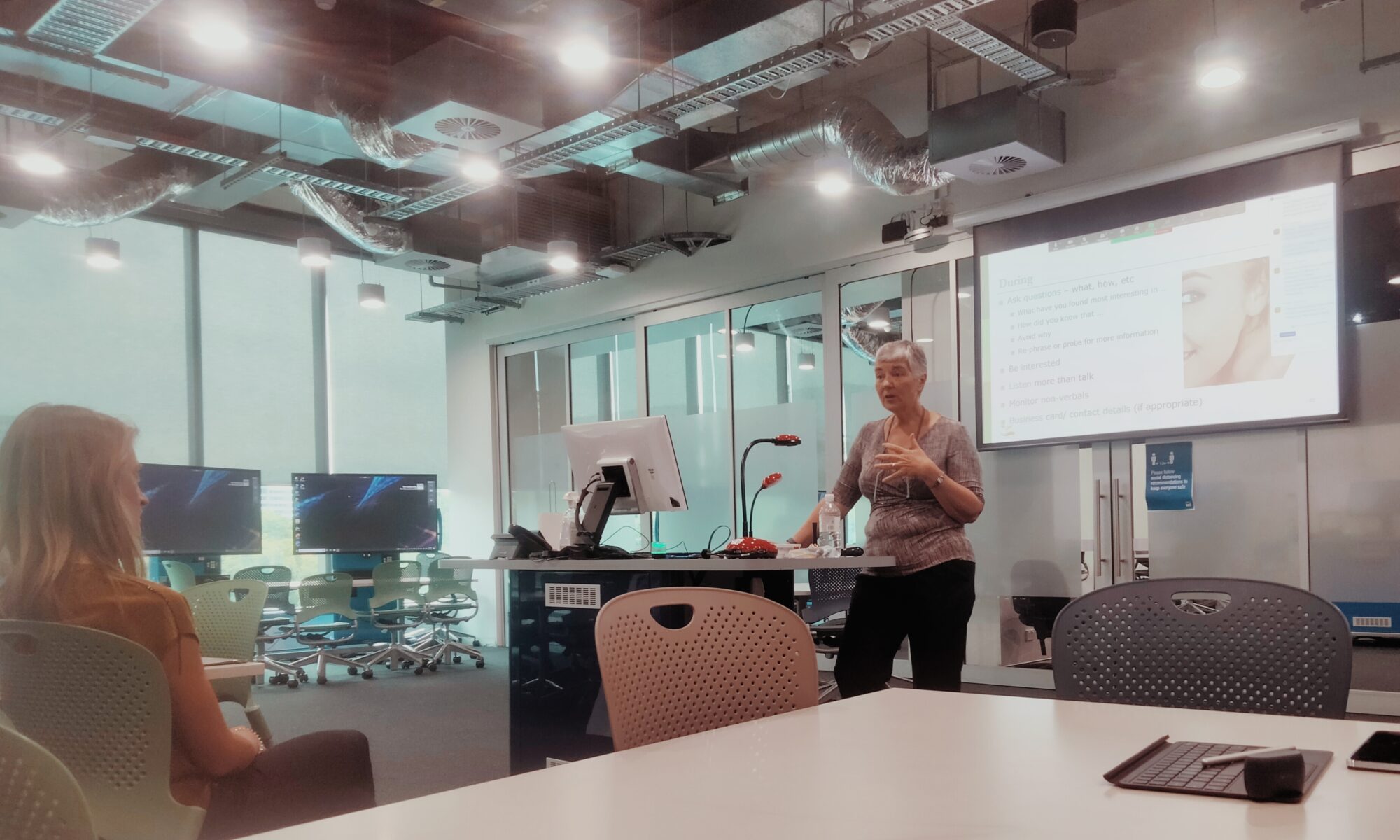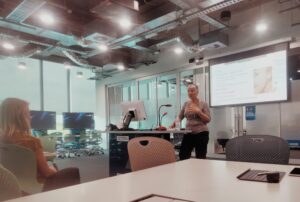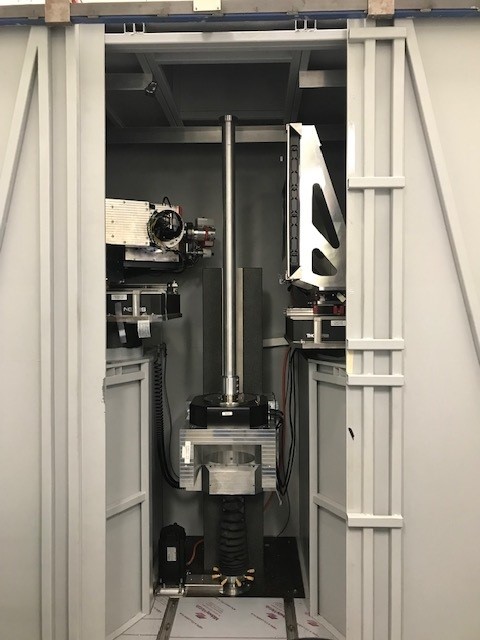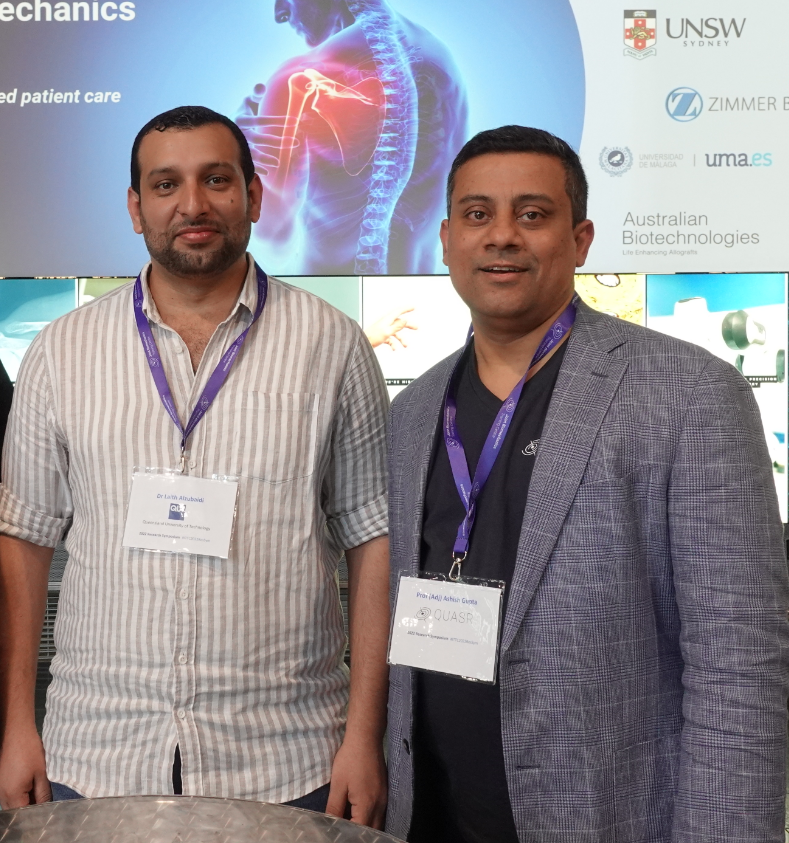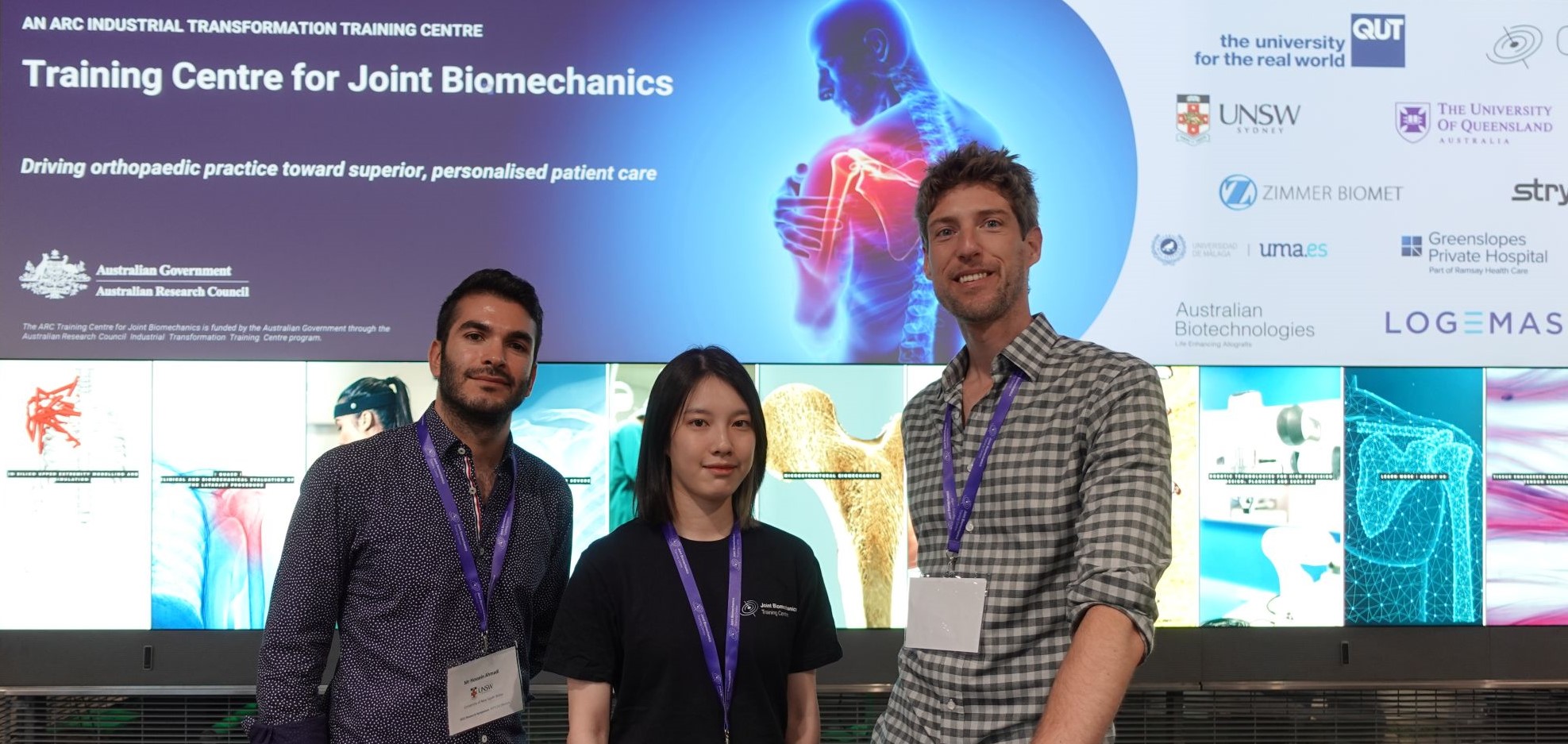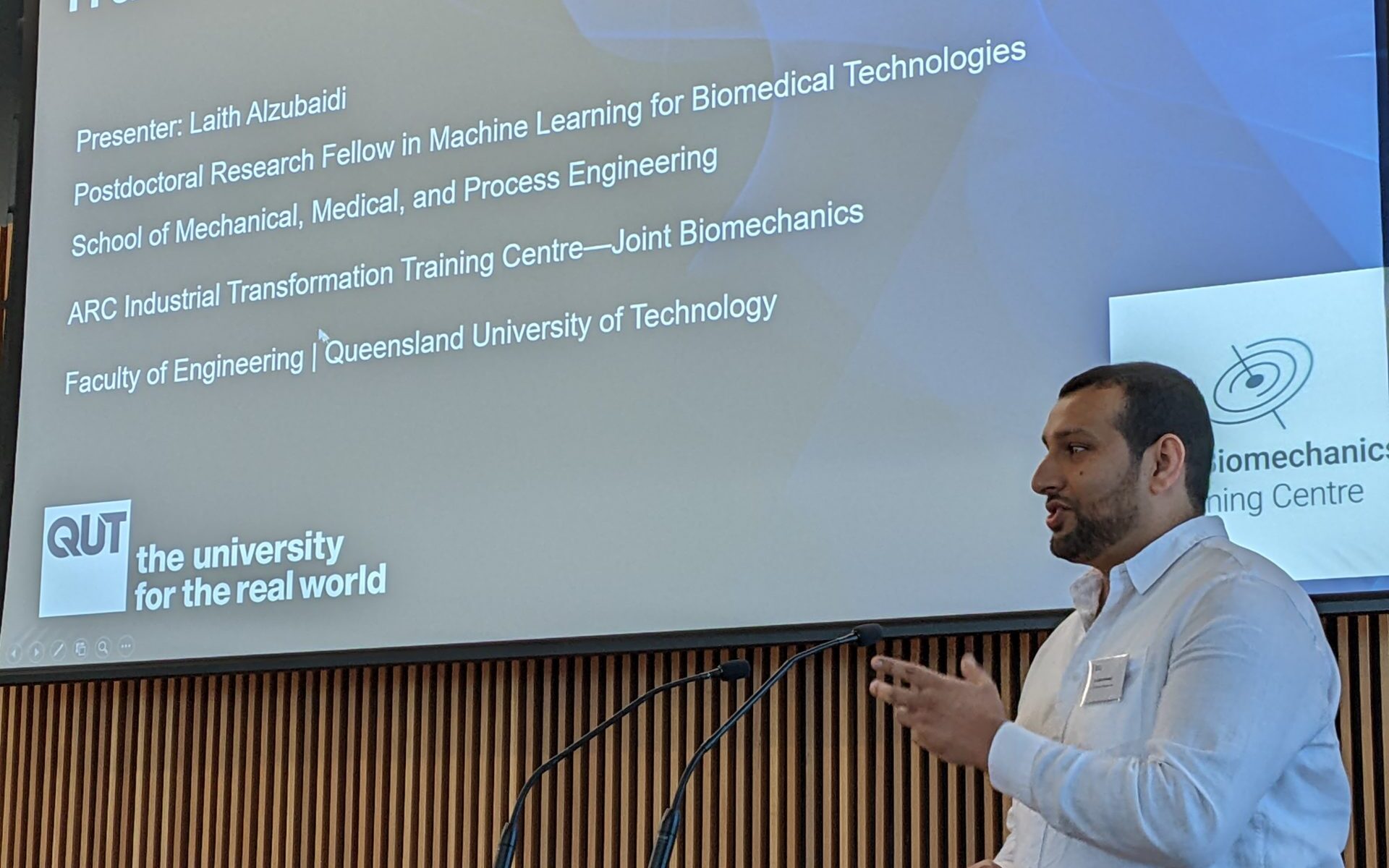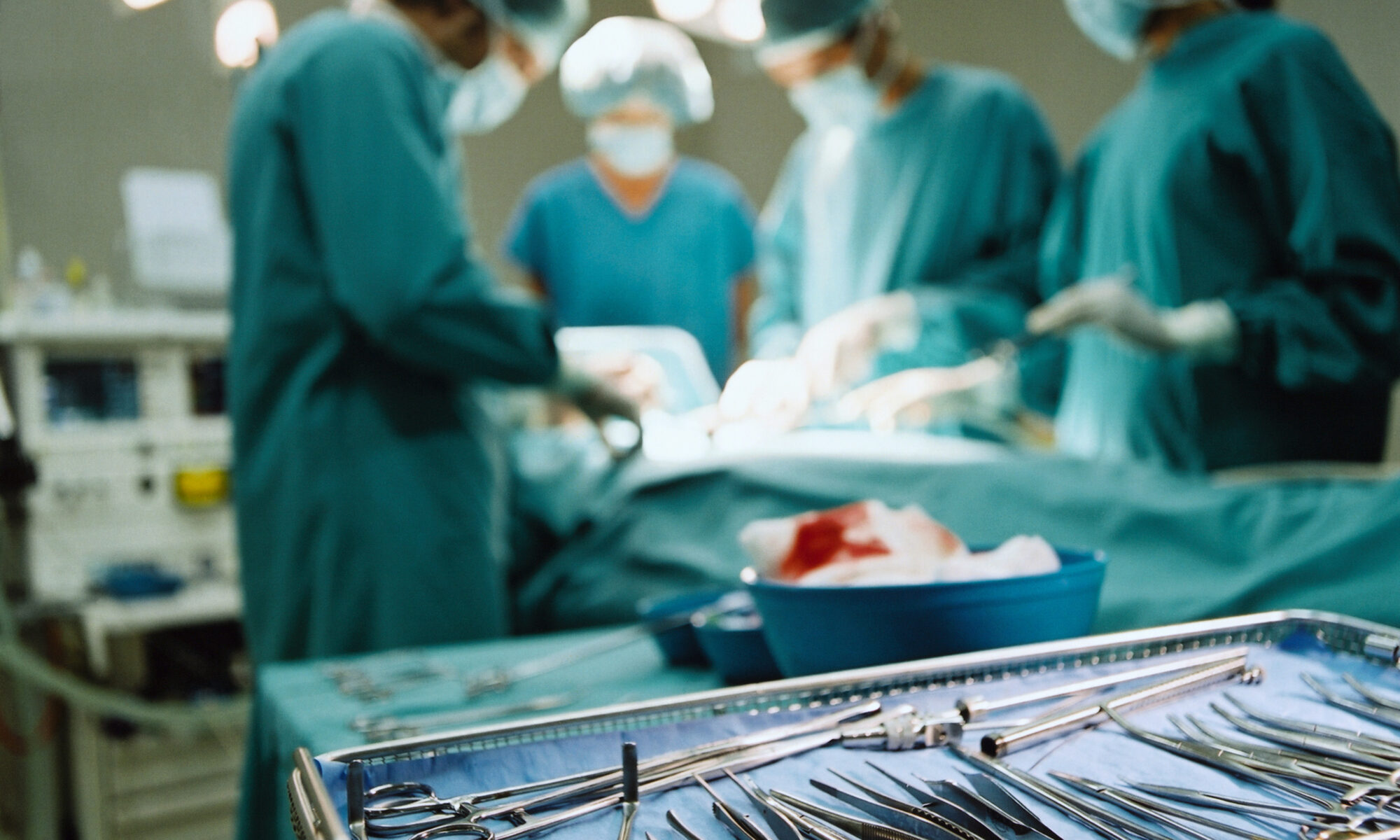On Friday 25th of November, the ARC Training Centre for Joint Biomechanics showcased their biomedical research and commitment to personalised patient care in their annual research symposium.
Held at the home of the IITC, the Queensland University of Technology’s Science and Engineering Centre, P Block at Garden’s Point campus our researchers students, industry (Stryker, Zimmer Biomet, Logemas, Australian Biotechnologies, ), clinical (Greenslopes Private Hospital, Adj. Prof Ashish Gupta and Adj. Prof. Ken Cutbush), and academic partners from the University of Queensland, University of New South Wales, visited the centre to review our research highlights from 2022.
For some, it was a first-time visit with members of the center team usually located in University of New South Wales and NeURA (post-doc Dr. Bart Bolsterlee, PhD student Yilan Zhang, and PhD student Mr. Hossein Ahmadi) meeting their colleagues for the first time.

The research symposium was opened by Centre Director Prof. Yuantong Gu with the official Welcome to Country where we acknowledged the Turrbal and Yugara as the First Nations owners of the lands where QUT currently stands; which was shortly followed by our 4 progam stream updates by our program leads and post-docs as follows:
Program 1
Prof Peter Pivonka – In-silico Upper Extremity Modelling & Simulation
Dr Bart Bolsterlee – Diffusion tensor imaging for assessment of muscle architecture in the shoulder
Program 2
A/Prof Saulo Martelli – Robotically assisted Joint Testing and Surgical Guidance
Dr Dermot O’Rourke – Biomechanical comparison of techniques for glenoid component implantation in shoulder arthroplasty
Program 3
Prof Justin Cooper-White & Dr. Eleonore Bolle – Tissue-engineered Scaffolds for Rotator Cuff Repair
Program 4
Prof Graham Kerr – Treatment Effectiveness – Digital & robotic technologies for upper limb movement assessment, physiology and rehabilitation
Dr Wolbert van den Hoorn – Validity of post-surgical shoulder mobility assessment tool: mymobility® App

After some refreshment, the symposium continued with the launch of our Seed Grant Scheme session and an inspirational speech by our guest Mr. Stephen Delo, Innovation Consultant expert and symposium career panellist. Mr Delo. brought his immense experience in his talk entitled ‘A Culture & Practice of Innovation,’ where he detailed insights and lessons from his extensive career in personal leadership and team management across 2 navies.
As an innovation consultant, Steve’s career has brought him to face many challenges and to tackle many career opportunities across a breadth of disciplines. He is currently acting as the Senior Advisor, Innovation, for the New Zealand Defence Force where he has established and facilitated networks and processes to assist intrapreneurial activity now leading to international engagements. He also currently works with Black Sky Aerospace as he applies his transformative leadership to innovative start-ups.
Steve offered the following simple, yet immensely powerful advice on how to create a culture of innovation to the team, regardless of career stage or discipline:
– Innovation is a resource and a commodity you can trade. It is valuable and not to be underestimated. Self belief is one the biggest factors for success. Move forward and ask yourself, ‘What is the risk of not doing it?’
– The team is more powerful than the individual. How do you measure success. Individually or as a team?
– Innovation is a social activity. Plant the seed and pay it forward to your team so they too can have the opportunities to advance.
– The seas of life can be rough, your team is your life jacket.
Steve’s talk highlighted the importance of collaboration and team dynamics for successful innovation across companies, industries, and fields which is core to the governance structure and vision for personalised patient care for the centre.
With this introduction, we introduced our seed grant pitchers who were tasked with designing cross-program and collaborative research projects with industry, academia, and our clinical partners for the opportunity to win a seed grant to to maximum total of $15,000 AUD.
Our 4 contenders presented their pitches to our esteemed seed grant panellists: Mr. Massoud Shahi (Zimmer Biomet), Prof. Yi-Chin Toh (QUT (Queensland University of Technology) University of Technology), Prof. Kevin Tetsworth (MQ Health), and Prof. Peter Pivonka (QUT (Queensland University of Technology).
Order of Presentations:
1. ‘Explainable Deep Learning approach for shoulder abnormalities detection.’ Lead Investigator: Dr Laith Alzubaidi; with co-investigators Mr. Jinshuai Bai, Dr. Asma Salhi, and Dr. Freek Hollman. Industry mentors: Prof. Yuantong Gu (QUT), Adj. Prof. Ashish Gupta (QUASR, Greenslopes Private Hospital, Akunah), and external collaborator Prof. Amin Abbosh (University of Queensland).
2. ‘Biomechanical characteristics of the human supraspinatus tendon in vivo under physiological loading.’ Lead investigators: Dr. Bart Bolsterlee, Dr. Eleonore Bolle, and Dr. Wolbert van den Hoorn; with co-investigators Dr Freek Hollman, Miss Yilan (Olivia) Zhang, Miss Asawari P., and Miss Sepideh Shemshad. Industry mentors: Prof. Lynne Bilston (University of New South Wales) and Adj. Prof. Ken Cutbush (Ken Cutbush Clinic – Brisbane Private Hospital).
3. ‘Non-invasive assessment of rotator cuff function.’ Lead Investigator: Dr. Wolly van den Hoorn; co-investigators: Dr. Eleonore Bolle, Dr. Roberto Pareyon, Mr. Francois Bruyer-Monteleone, and Miss Yuyao (Amy) Ma. Industry mentors: Prof. Francois Hug from the Université Côte D’Azur, A/Prof Kylie Tucker (University of Queensland), and Adj. Prof Ashish Gupta (QUASR, Greenslopes Private Hospital, Akunah).
4. ‘Toward precision tracking of the shoulder joint using ultrasound tomography.’ Lead investigator: Dr Dermot O’Rourke; with Mr Arun Jolly, Mr Ahmed Sewify, Miss Natali Uribe, Dr Roberto Pareyon, Mr Maxence Lavaill, and Mr xiaolong fan. Academic mentor: A/Prof Saulo Martelli.
After an exciting back and forth between the presenters, judges, and audience with some tricky questions, we welcomed our career panellists A/Prof Kylie Tucker (The University of Queensland), Mr Alex Muir (Logemas), Ms Jenna Lyon (Stryker), and Mr. Stephen Delo MBE, FCPHR to share their unique insights into collaboration, teamwork, and what it takes to succeed in the world of collaborative research and as part our our panel ‘Innovation Culture and Your Career.’ Moderated by our clinical lead Adj. Prof. Ashish Gupta (QUASR, Greenslopes Private Hospital), Akunah, the panel shared a few gems with the audience regarding the elements for successfully building a career and creating opportunities for yourself and others:
1. Mr Stephen Delo MBE, FCPHR: It is important for each member for the team to be who they are. Everyone brings a superpower, and that’s what people look for when building a team. The trick is to ensure joint vision so individuality doesn’t cost the team goal. Everyone must pull in the same direction.
2. Ms Jenna Lyon: Recruiters acknowledge the balance between technical ability and team fit. Attitude and self-motivation can make someone stand out more than their technical ability.
3. Mr Alex Muir: Values are important in collaborative team work and recruitment – ensure you research the company’s values and get clear on how you align before approaching them.
4. Mr Stephen Delo MBE, FCPHR : Mindset is a switch – it can be turned on and off. be mindful of self-talk and how you perceive others to foster motivation.
With thanks to our panellists and gifts of appreciation, at 5:00pm we moved to our last segment of the day with our poster display and networking event in the Cube. It was fantastic to see the students sharing their research methodology and results with the industry partners, and the great interest taken in particular by our early PhD students in the center to Mr. Delo’s work regarding collaborative culture and career coaching.
At 5:30pm we celebrated one last substantial achievement, with the announcement of our seed grant winners: Team 1 ‘Explainable Deep Learning approach for shoulder abnormalities detection.’ Lead Investigator: Dr Laith Alzubaidi, and Team 4 ‘Toward precision tracking of the shoulder joint using ultrasound tomography.’ Lead investigator: Dr Dermot O’Rourke.

Thank-you again to our key partners and our industry partners from our Industry Advisory Committee (IAC). Left to Right: Adj. Prof. Ashish Gupta (QUASR, Greenslopes Private Hospital, akunah), Prof. Peter Pivonka (QUT (Queensland University of Technology) & Centre Deputy Director), Mr Alex Muir (Logemas), Ms Jenna Lyon (Stryker), Mr David Brezzo (Zimmer Biomet), Ms Monica Russell (Materialise), and Prof. Yuantong Gu (QUT (Queensland University of Technology), Centre Director).
We can’t wait to showcase our research developments and growth with you all at the next Research Symposium.









